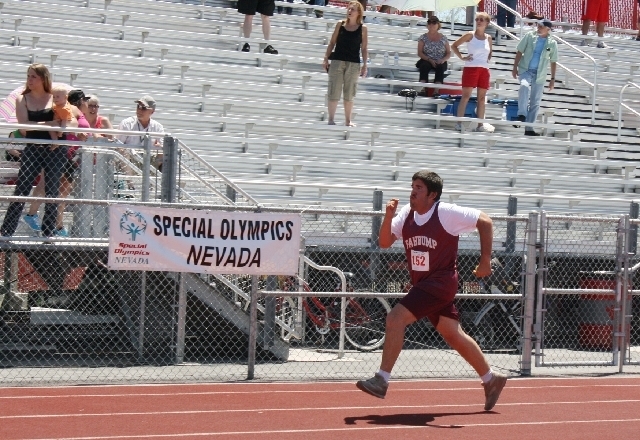Special Olympics Nevada regroups in wake of $45,000 grant reduction

Special Olympics Nevada is struggling to absorb the unexpected loss of half of a major grant, a $45,000 budget reduction that will mean fewer opportunities for disabled students in the Clark County School District.
“For a small organization like ours, that can be a pretty big hit,” said Maggie Schwarz, regional vice president for Special Olympics Nevada, on Wednesday.
The nonprofit’s annual budget is just under $1 million. It gets an annual grant of between $90,000 to $100,000 from its parent company, Special Olympics International, which receives the money from the federal government. The grant helps support the School Partnership Programs at the Clark County School District.
The state organization learned of the $45,000 cut in June, a reduction brought on by federal sequestration cuts.
“For us, the financial strain is immediately right now,” Schwarz said of the cuts that took effect in July. “But we’ll have to carry it out for next year as well.”
The partnership program was one of the first of its kind in the nation and has been around for 12 years in Clark County. Just under 4,000 students participate in the programs, said Barbara Chambers, coordinator for the Adapted Physical Education Program for disabled students at the Clark County School District.
That’s a number Chambers hoped to increase, given the more than 300,000 students in the district. But in the aftermath of the grant reduction, doing so will have to wait.
“We’ll have to put a cap on the number of teams or students who are able to participate (in the programs),” Chambers said. The cap means students will likely face a waiting list for activities. “It’s something that we are very sad about.”
Schwarz said staff will look for ways to make programs more efficient. The fates of other, smaller programs offered by Special Olympics Nevada are also in question as the organization continues to look for ways to absorb the midyear cuts.
The programs, at the elementary and secondary school level, provide disabled students the opportunity to participate in sports activities along with their non-disabled peers, Schwarz said. Basketball, soccer and track and field are some of the most popular activities.
“It benefits everyone in the community,” she said, adding that it broadens the experience for the students, who then have a more positive outlook when they’re out in the community.
The programs raise the self-esteem of students with disabilities, while it makes their peers more tolerant, empathetic and understanding, Chambers said.
The district has 60 adapted physical education teachers, Chambers said. They go into a general physical education class and provide any modifications and accommodations students with disabilities require to take part in the same activities as his peers.
“We are one of the best programs in the country,” Chambers said.
Schwarz said the nonprofit is trying to figure out how to continue the programs, knowing that the grant is uncertain funding. Most of the organization’s budget is funded through local donations, sponsorships and grants from local businesses. Those interested in contributing to Special Olympics Nevada can visit http://www.sonv.org/ /www.sonv.org/
Schwarz said, “I think for us, the reality check is that the grant is something that we would like to be able to replace completely through our local funding efforts.”
Contact Yesenia Amaro at yamaro@reviewjournal.com or 702-383-0440.












